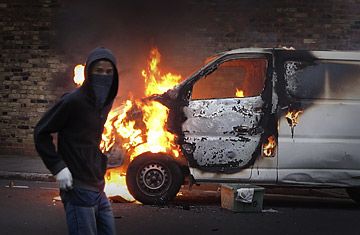
The venerable house of Reeves furniture store has stood in Croydon, South London, since Queen Victoria was in her pomp. It came through two world wars unscathed. But on Aug. 8, it was smoldering, a symbol of the wantonness and waste of the London riots. Outrage over its destruction flickered everywhere, from the BBC to the broadsheets. The Daily Mail offered a tabloid's eulogy, with the headline BLITZED. 140 YEARS OF BUSINESS GOES UP IN FLAMES. Mayor Boris Johnson, after rushing back from his summer holiday, delivered a clipped statement in front of the ruins. "It's heartbreaking to see what good, local businesses like the Reeves family have suffered last night," he said. "It's just unbelievable."
Hundreds of stores across London, Manchester, Birmingham and other British cities were torched or ransacked in four nights of mayhem after the police killing of a north Londoner named Mark Duggan, whose death was quickly overshadowed by the wave of recreational violence. But the House of Reeves touched the rawest nerve because it wasn't just another electronics shop or minimart. Since 1867, its stock in trade has been the kind of stolid, not-too-expensive furniture suite — dune-colored sofa with matching armchair — that is a staple of cozy, convivial middle-class life in the U.K. The store was destroyed by people who don't value such inexpensive indulgences because even that way of life is out of their reach.
As Britain cleans up and carries on after the riots, the nation and the world are asking, What just happened? Prime Minister David Cameron, who cut short a Tuscan holiday, had a quick answer on returning to England: "This is criminality, pure and simple." The tape — the hours of CCTV, cell-phone and news footage — would seem to back him up. The hooded arsonists, looters and brick heavers had little to say for themselves. They mocked store owners, laughed at the "feds" who stood in safe police lines down the block. In one quietly unbearable video clip, a passel of them helped a bleeding boy to his feet — only to steal from his backpack.
It seems to comfort the authorities to see the rioters as amoral outliers. "We want to make it absolutely clear: they have nothing to protest against," said one Manchester police official. But somewhere behind the seeming anarchy lie the very real discontents of modern Britain. Start with something called the Gini coefficient, a figure used by economists to indicate how equally (or unequally) income is distributed across a population. In this traditional measure, Britain fares worse than almost every other developed country in the world. According to International Monetary Fund economists Michael Kumhof and Romain Rancière, nearly 30% of income in the U.K. in 2005 (the most recent year for which data exist) went to the top 5% of earners; in no other major European country is so much concentrated in the hands of so few. The Organisation for Economic Co-operation and Development says the U.K. has the worst social mobility of the developed nations: those born to a certain class tend to stay there.
There is one other developed country with a similarly large, immobile underclass: the U.S. The IMF statistics show that more than 33% of American income goes to the top 5% of earners. But unlike Americans, Britons feel a deep pessimism about their situation. A 2009 Sutton Trust survey found that less than 40% of respondents in the U.K. believed there were equal opportunities to get ahead in their country. (According to a 2011 Pew Economic Mobility Project poll, 68% of Americans say they have achieved or will achieve the American Dream.)
